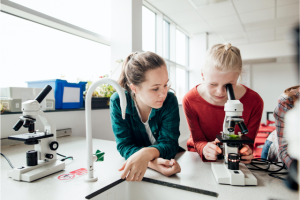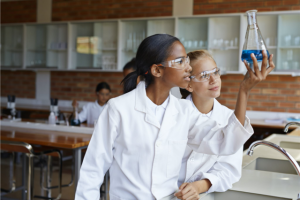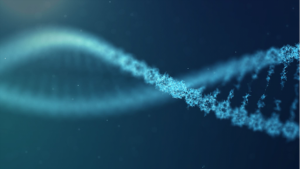Questions may be directed to Science Department Head Adam Taylor at adam.taylor@burnabyschools.ca
The Junior Science Program
The goal of the junior science program is to develop student’s scientific literacy- to build their skills, knowledge and understanding of scientific concepts and processes in order to make informed personal, social and environmentally responsible choices.
The junior science curriculum involves both conceptual and inquiry-based learning with an emphasis on “doing” as outlined by the six science curricular competencies. Students are expected to be able to demonstrate these competencies and skills with increasing depth throughout their junior science careers. The science curricular competencies include:
- Questioning and predicting
- Planning and conducting
- Processing and analyzing data and information
- Evaluating
- Applying and innovation
- Communicating
A place-based approach that emphasizes the value of learning from student’s own community and region along with First Peoples knowledge and perspectives is embedded throughout the Science curriculum.
 Science 8
Science 8
Course Code: MSC–08
In Science 8 students are introduced to laboratory skills and safety and begin to apply the scientific method to their explorations.
Grade 8 students participate in the school’s science fair in February.
The big ideas explored in Science 8 include:
- Life processes are performed at the cellular level
- The behaviour of matter can be explained by the kinetic molecular theory and the atomic theory
- Energy can be transferred as both a particle and a wave
- The theory of plate tectonics is the unifying theory that explains Earth’s geological processes
 Science 9
Science 9
Course Code: MSC–09
In Science 9, students continue to build on their laboratory skills and to explore the impacts of science and technology on individuals, society and the environment.
The big ideas covered in Science 9 include:
- Cells are derived from cells
- The electron arrangement of atoms impacts their chemical nature
- Electric current is the flow of electric charge
- The biosphere, geosphere, hydrosphere, and atmosphere are interconnected, as matter cycles and energy flows through them
 Science 10
Science 10
Course Code: MSC–10
Science 10 students continue to delve deeper into transferring and applying learning to new situations, and in evaluating investigation methods, claims and sources of information. The big ideas explored in Science 10 include:
- DNA is the basis for the diversity of living things
- Energy change is required as atoms rearrange in chemical processes
- Energy is conserved and its transformation can affect living things and the environment
- The formation of the universe can be explained by the big bang theory